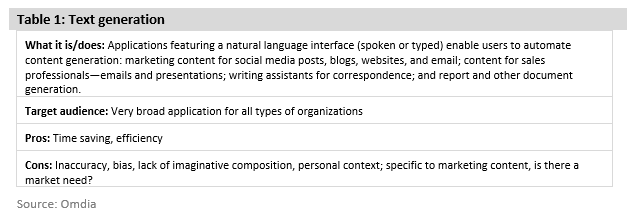A Manifesto Against Generative AI Writing
A personal essay by the principal analyst in AI and NLP at Omdia, our sister research firm
March 30, 2023

Generative AI (GAI) dangles an alluring idea that it will take care of a lot of your writing needs.
This manifesto is a warning to all humans — do not abandon the art, skill and science of writing.
Don’t do it.
If you do, you are ceding a key element of what makes you different and more valuable than any mammal, machine or AI.
You should write. There are restricted lanes where it makes sense to let AI do the writing, but you should write as much as possible because you are a better writer and communicator than AI. All verbal communication (speaking, writing) requires supreme command of language and emotional intelligence. These are abilities you have that AI does not.
Further, you should write as much as possible because writing is key to critical thinking. Critical thinking is non-linear thinking, and work that requires non-linear thinking is pretty much the only type of work you can do that AI cannot.
AI will do your writing?
The headlines are filled with jaw-dropping stories about the wonders of ChatGPT, a superbly genius invention by OpenAI, who saw the opportunity to equip one of the biggest large language models (LLM) in the world with an easy-to-use, natural language interface as a way to unlock the power of these models to create GAI outputs.
One of the most talked about use cases for GAI is text generation. In our seminal GAI report published on March 3, Omdia described text generation as follows:

As you can see, the text generation use case lists some pros, but there are certainly some significant cons to it as well — not that those cons have slowed the text generation stampede just yet. (It is early days. The market will decide how important those cons are to the market growth of text generation.)
There are already lots of start-ups and specialists chasing the text-generation business. In our most recent count, there were 31 companies offering text generation for sales or marketing uses and another 30 companies that could be described as writing assistants. That does not count the bigger players such as Microsoft, Google, Salesforce, and Adobe offering text generation in these areas.
So it would seem that a lot of people in the business world are interested in offloading the work of written communications to … someone else? A disembodied black box?
It gets worse. When ChatGPT dropped last November, universities and secondary schools were overrun with bouts of ChatGPT plagiarism as students eagerly rushed to have AI write their papers and reports. I guess there are a lot of people who not only dislike writing, they dislike it so much they are willing to cheat to avoid doing it.
The case against using AI to write
Lack of emotional intelligence
Let us expand on one of the big reasons why letting AI write for you might not work out so well: AI’s lack of emotional intelligence.
If you are writing personal correspondence, how will the AI know the details of your personal history with any recipient? How personalized do you think AI can get outside of writing for personas? What about the context that is needed for ongoing interactions between you and your audience?
Companies have been working hard to fill in that type of context using AI for several years with a bit of success, and GAI does not necessarily accelerate that process.
Many marketing messages are superbly nuanced and creative, leveraging elements of time, space, and my favorite sentiment — sarcasm. Natural language understanding (NLU) has been the code AI has yet to crack successfully. I am skeptical (as are most natural language AI experts) that AI ever will. Humans inherently understand nuance, sentiment, sarcasm, and tone; AI does not.
Erodes critical thinking
“Writing is thinking on paper.” -- William Zinsser, author of On Writing Well: The Classic Guide to Writing Nonfiction, 1976
“Writing practice builds critical thinking, which empowers people to take charge of their own minds so they can take charge of their own lives … and improve them, bringing them under their self-command and direction.” -- The Foundation for Critical Thinking, 2020
Perhaps the more important reason to reign in AI writing is because writing is so important to critical thinking. In essence, the less you write, the less critical you become.
Try a web search of ‘why writing is critical to critical thinking’ and you will discover that the volume of research papers and articles on the subject is substantial.
Consider an excerpt from the abstract of a research paper published in 2007 in the National Library of Medicine and the National Center for Biotechnology Information called ‘Learning to Improve: Using Writing to Increase Critical Thinking Performance in General Education Biology.’
Increasingly, national stakeholders express concern that U.S. college graduates cannot adequately solve problems and think critically. As a set of cognitive abilities, critical thinking skills provide students with tangible academic, personal and professional benefits that may ultimately address these concerns. As an instructional method, writing has long been perceived as a way to improve critical thinking.
In the current study, the researchers compared the critical thinking performance of students who experienced a laboratory writing treatment with those who experienced traditional quiz-based laboratory in a general education biology course. The effects of writing were determined within the context of multiple covariables.
Results indicated that the writing group significantly improved critical thinking skills whereas the non-writing group did not. Specifically, analysis and inference skills increased significantly in the writing group but not the non-writing group. (emphasis added)
Experienced writers understand that writing stimulates thinking, whereas people who do not write so much do not see it that way. In a blog post from Purdue University on academic success and writing, the idea of writing to think comes to life:
Say the word ‘writing’ and most people think of a completed publication. But say the word ‘writing’ to writers, and they will likely think of the process of composing. Most writers would agree with novelist E. M. Forster, who wrote, “How can I know what I think until I see what I say?” (Forster, 1927, p. 99). Experienced writers know that the act of writing stimulates thinking.
Inexperienced and experienced writers have a very different understanding of composition. Novice writers often make the mistake of believing they have to know what they are going to write before they can begin writing. They often compose a thesis statement before asking questions or conducting research. In the course of their reading, they might even disregard material that counters their pre-formed ideas. This is not writing; it is recording.
In contrast, experienced writers begin with questions and work to discover many different answers before settling on those that are most convincing. They know that the act of putting words on paper or a computer screen helps them invent thought and content. Rather than trying to express what they already think, they express what the act of writing leads them to think as they put down words. More often than not, in other words, experienced writers write their way into ideas, which they then develop, revise, and refine as they go.
With that in mind, are you ready to abandon critical thinking? How relevant and valuable will you be as a worker in the time of AI if you cannot offer a differentiated set of abilities?
The proper lanes for AI writing
There are areas where AI writing and text generation make sense, such as producing drafts for various marketing and sales communication that employees then edit or rewrite; automated report generation (detailed data of financial reports, forms for pharma research, etc.), automating health care administration paperwork for clinicians, providers, and insurance; or producing A/B testing of marketing messages.
Note that none of these use cases are new to AI — many companies have labored to bring these natural language use cases to market since as early as 2015, with limited success. However, GAI could provide the true spark to move many of them forward.
So be wary of how far you want to go with AI writing. A good rule of thumb used by many AI ethicists these days is this: The question you should ask isn’t ‘Can I do this AI?’ but rather, ‘Should I do this AI?’
Read more about:
ChatGPT / Generative AIAbout the Author(s)
You May Also Like


.jpg?width=700&auto=webp&quality=80&disable=upscale)
.jpg?width=700&auto=webp&quality=80&disable=upscale)
.jpg?width=700&auto=webp&quality=80&disable=upscale)
.jpg?width=300&auto=webp&quality=80&disable=upscale)
.jpg?width=300&auto=webp&quality=80&disable=upscale)
.jpg?width=300&auto=webp&quality=80&disable=upscale)

.jpg?width=300&auto=webp&quality=80&disable=upscale)